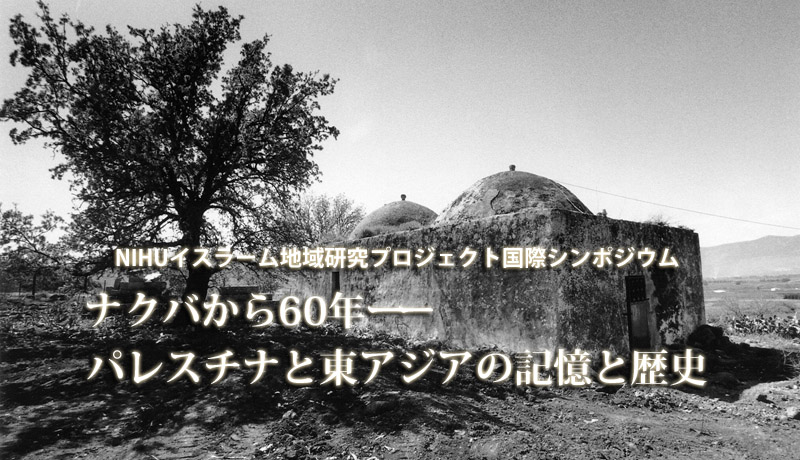| 写真:広河隆一. 参考資料:広河隆一監督作品 記録映画「パレスチナ1948・NAKBA」 |
 |
 |
|||||||||||||||||||||||||
|
【京都セッション】
Narrating and Listening to the Memories of Nakba in Kyoto: Dialogue between Palestine and East Asia 【要旨】
9・11の直後、チリ出身の作家、アリエル・ドルフマンは「世界には無数の9・11」があると語り、2001年9月11日、ワシントンとニューヨークで起きた出来事を、世界に無数に存在する9・11の記憶へと開いていくことの重要性を説いた(しかし、その後の世界で生じたことは周知のとおり、ドルフマンの願いとは裏腹に、アメリカ合州国のナショナルな悲劇としての出来事の領有であり、それは、アフガニスタン、そしてイラクに対する暴力へと展開していくことになった)。ホロコーストもまた、シオニズムの言説のなかで、「ユダヤ人」のナショナルな悲劇として特権化されることで、パレスチナ人に対する暴力を正当化する役割を担っている。だとすれば、私たちが出来事の記憶を語ることの意義とは、個々の出来事の特異性をそれとして受け止めながら、同時にそれを(相対化したり矮小化したりすることなく)他者の悲劇へとつなげ、開いていく、その回路を私たちがいかにしてか見出すことにあるのではないか。 ドルフマンに倣って言えば、世界には無数の「ナクバ」がある。1910年、日本の韓国併合によって祖国を喪失し、その民族的アイデンティティを否定された朝鮮人民にとってこの出来事はまぎれもない「ナクバ」であっただろう。朝鮮人民は以後、36年にわたり日本帝国主義支配下でこの「ナクバ」の破壊的結果をその身に被りながら生きることになる。強制連行のみならず、多数の住民が内地への移住を余儀なくされるのも、日本の植民地政策の結果だった。また、日本軍性奴隷制によって、筆舌に尽くしがたい苦難を味わった無数の女性たちがいる。それは性暴力であったがゆえに、被害女性たちの経験は戦後社会において半世紀近くも告発されることなく抑圧されてきたのだった。 パレスチナ人が、難民であれ占領下の住民であれ、あるいはイスラエルのパレスチナ人であれ、60年前の「ナクバ」の暴力の結果を今日に至るまでその身に被り続けているように、朝鮮におけるナクバの暴力も、1945年の日本の敗戦をもって終わったわけではない。日本の朝鮮植民地支配の結果、日本社会に暮らすことになった朝鮮人もまた、戦後60年間、「半難民」状態におかれ、さまざまな差別にさらされてきた。しかしながら、日本の「国民の正史」において、日本の植民地主義が朝鮮人にもたらしたこれら「ナクバ」の記憶がじゅうぶんに共有されているとは言いがたい。むしろ、それは、イスラエルの国民の歴史における「ナクバ」同様、ナショナリズムによって抑圧され、隠蔽されているのである。 日本とイスラエルはアジア大陸の東西両端にあって歴史的否認の同盟を結んでいるが(そこでは、日本による植民地支配は「ホロコースト」ではないということが、日本による歴史的犯罪の責任を否定するために主張されている)、ナクバの記憶もまた、ナショナルな占有に抗して、他者のナクバの記憶へと開かれていくことが必要なのではないかと考える。京都セッションでは、ナショナル・イデオロギーによって抑圧されてきたアジア大陸の東西両端におけるナクバの記憶をすりあわせることで浮上するさまざまな問題について考えたい。「東アジアとパレスチナの対話」と題したゆえんである。 まず、基調講演として、占領下およびパレスチナ難民の人権問題について取り組んでこられたサリー・ハナフィー氏(ベイルート・アメリカン大学教授)より、ナクバから今日に至るまで一貫して Spcaiocide(空間的抹殺)として展開する、イスラエルによるパレスチナの記憶と土地の破壊についてお話いただいたあとで、文京洙氏(立命館大学教授)より「在日朝鮮人問題の起源と現在」と題して、「在日朝鮮人」をめぐる問題の根源にいかなる暴力が作用しているのかについてお話いただく。両者の報告には、同じ歴史の地脈で結ばれたものがあるのではないか。次に、ながらく旧日本軍性奴隷制(いわゆる従軍「慰安婦」)の暴力の問題に取り組んでこられた山下英愛氏より、韓国の「慰安婦」運動における日本人慰安婦問題の対応について論じていただく。そこでは、被植民者のナショナリズムが、いったい誰を他者とし、いかなる暴力として作用しているか提起することになるだろう。
Immediately after the incident of 9/11, Ariel Dorfman, a Chilean writer, wrote: "there have been countless 9/11's in the world," and he pressed the significance of tying in the tragedy which took place in Washington and New York on that day to those memories of other 9/11's throughout the world. Sadly, what followed the incident, as you all know well, was the appropriation of the event by the U.S. as its own national tragedy, which developed later into a series of violence against Afghanistan and Iraq. Likewise, the Holocaust plays a crucial role in Zionist discourse by justifying Israeli violence against Palestinians. With these two instances of co-opting national tragedies as a backdrop, it would seem clear that the significance in narrating our memory of an incident in its true singularity, and without relativizing or minimizing it, lies in our exploration of ways to open up and connect it to the memory of tragic events suffered by others in different times and different places. Following Dorfman's expression, there have been countless "Nakba's" in the world. The annexation of Korea by Japan in 1910, which deprived the Korean people of their national identities, was certainly a Nakba-like experience. For 36 years, the Korean people lived under Japanese colonial rule, suffering from cultural, political and economic imperialism. The forced migration of large numbers of Koreans to Japan was also the result of Japanese colonial policies and numerous women were sexually victimized by the Japanese military, left physically and emotionally scarred for life. Just as Palestinians--whether refugees, those living under Israeli military occupation or those in Israel--have been suffering from the violent consequences of the Nakba tragedy 60 years ago, the end of Japanese colonial rule in 1945 did not mean the end of the violence of Nakba for Korean people. Those who came to live in Japan as the result of Japanese colonialism have remained in the status of "quasi-refugees," and have been exposed to various forms of discrimination in Japanese society throughout these 60 years. However, the memories of the Korean Nakba have not been fully admitted or appreciated by Japanese in their national history. Rather, they are repressed and sometimes negated just like the memory of the Palestinian Nakba in Israeli national history. Japan and Israel, which exist at the both ends of the Asian continent, are in the alliance with each other in terms of the negation of their own criminal pasts. That Japanese colonial rule is not "Holocaust" because the Holocaust is the incomparable event in the human history is being claimed by Japanese nationalists just to negate Japanese responsibilities for the historical crimes. The memories of Nakba, either Palestinian Nakba or Korean, or the one suffered by Eastern European Jewery, need to be opened up to the memory of others, against the national appropriation of its memory. In Kyoto, we will think over diverse questions regarding this phenomenon through dialogue between Palestine and Eastern Asia, both of which narrate its own experience of Nakba. Prof. Sari Hanafi (American University in Beirut), who has long been working for the Human rights of Palestinian refugees and those living under the occupation, will talk in his keynote speech about the destruction of the land and memory of Palestine which has been developing as the violence of "Spaciocide" since Nakba until today. Subsequently, there will be a speech by Prof. Mung GyongSu, titled " The Origin and the Present of the Problems of Korean Residents in Japan," which will illustrate the nature of the violence in the root problems of KMJ(Korean Minority in Japan) . Both speeches will, hopefully, reveal a historical vein connecting the two Nakbas. Then, Ms. Yeong-ae Yamashita, who has been engaging herself in the activities for supporting "Korean Comfort Women" will speak about how Korean feminists supporting Korean ex-comfort women dealt with the issue of Japanese comfort women. Her argument will exhibit the problematic nature of the colonized as they respond with a radicalized nationalism, and show that this nationalism is also working as a sort of violence against "the other" by negating the other's memory. 【プログラム】
Session 3 10:00-14:30 "Narrating and Listening to the Memories of Nakba in Kyoto: Dialogue between Palestine and East Asia" Chair: 末近浩太(立命館大学)
15:00-17:00 "In Thinking Back to the Symposium" Chair: 小杉 泰(京都大学)
【基調講演要旨】 By Sari Hanafi In this paper, I argue that the Israeli state of exception should be understood as the potentiality of a structure of juridical-political de-localization and dislocation aimed at transferring the Palestinian population whether internally or outside of fluid state borders. In other words, the Israeli colonial project is "spacio-cidal" (as opposed to genocidal) in that it targets land for the purpose of rendering inevitable the "voluntary" transfer of the Palestinian population primarily by targeting the space upon which the Palestinian people live. This systematic destruction of Palestinian living space becomes possible by deploying bio-politics to categorize Palestinians into different groups, with the aim to render them powerless. Thus, spacio-cide involves a mix between three strategies. First, it involves 'space annihilation' (similar to that witnessed in Europe during World War Two, though differently in the case of Israeli practices this is a major not minor tactic). The second strategy involves, ethnic cleansing, to use the words of Ilan Papp? (2006). Ethnic cleansing was part of a long-standing Zionist plan to manufacture an ethnically pure Jewish state. However, this has happened in subtle ways in the case of the Occupied Territories. "Israeli domination in the Palestinian Territories means the reduction of lives to 'bare life' without eliminating too many people, the destruction of habitable space without expelling too many people from that space, the production of impoverishment without starvation, and the denial of access to medical treatment without allowing the outbreak of epidemics. Israeli authorities are very careful not to obstruct this delicate balance." (Ophir, 2004) The third strategy, deployed in the face of resistance to space annihilation and ethnic cleansing, consists of what Oren Yiftachel calls "creeping apartheid." Creeping apartheid utlizes increasingly impregnable ethnic, geographic, and economic barriers between groups vying for recognition, power, and resources (Yiftachel, 2006). By examining the political-theological underpinnings of colonial rule, the purpose of this paper is threefold. First it describes and conceptualizes spacio-cide as a framework for understanding the dynamics of Israeli territorial control over Palestinian territory and what Ronen Shamir (forthcoming) calls the de-coupling population and territory, which is ongoing, and ceaselessly operates at both the collective and individual levels. Second, the paper shows that the process of spacio-cide has become possible because of the extensive employment of bio-politics and the state of exception. Third, the paper demonstrates that spacio-cide has operated in a complex context in which Palestinians have responded to colonial practices through acts of both non-violent and violent resistance (e.g., targeting the Israeli military apparatus but also terrorist acts targeting Israeli civilians). |
||||||||||||||||||||||||||
 |
 |









